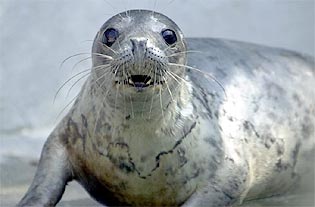|
Seal culling in Britain was banned in 1978, with conservationists and fishermen at loggerheads over its reintroduction since.
THE idea of culling seals on the coasts of Scotland was raised by a former Scottish Executive minister yesterday, leading to the reopening of divisions between environmental campaigners and fishermen.
Alasdair Morrison, the Labour MSP for the Western Isles and the former deputy enterprise minister, said ministers should discuss the controversial move.
"Culls are not unique to the Outer Hebrides or indeed to other parts of Scotland," he said.
"It happens in terms of mink, hedgehog and deer, and again, if required, it should also happen with the seal population around the Hebrides and around the British Isles."
The comments come only days after animal-right activists reacted with fury when Canada launched the largest single seal hunt in half a century. The Canadian government said hunters would be allowed to kill about 350,000 seals this year.
The hunting of young seals for their fur almost ended in the face of international outrage, but with seal numbers increasing and fur again in fashion the hunt has returned.
About 38 per cent of the world population of grey seals is found in Britain and more than 90 per cent of them breed in Scotland, the majority in the Hebrides and in Orkney.
Britain is also home to about 40 per cent of all European common seals; 87 per cent of them live in the Hebrides and Northern Isles, the Firth of Tay, the Moray Firth and the Wash in England.
Seal culling was banned in 1978, and fishermen and conservationists have been deadlocked over its reintroduction to protect fish stocks since.
Each seal eats about 2.5 tonnes of fish a year, which fishermen claim costs them £60 million annually in valuable fish such as salmon and trout.
However, conservationists argue that seals do very little damage to salmon and sea trout stocks as they tend to eat less valuable fish, and the fishing lobby has struggled in the past to convince the government that seals are eating their business.
The fresh call for a cull last night provoked an angry reaction from environmentalists, but representatives from the fishing industry backed the call.
Doubt was also thrown over the effectiveness of any cull, with experts from St Andrews University warning that it would have to be highly selective.
Advocates for Animals, which has fiercely opposed a seal ban in the past, said it was "appalled" when seals were blamed for the shortages of fish.
"Increasingly, seals are being persecuted in the name of fisheries’ protection when commercial overfishing is the real problem," said a spokesman.
"Time and time again, the fishing industry claim stocks are not recovering because of the seals, but the industry needs to look at itself.
"The issue over seals has grown in international importance and it is our duty to protect them."
However, the Scottish White Fish Producers’ Association believes a cull of seals would help the hard-pressed industry.
"It is a proven scientific fact that of the total annual mortality of fish in the North Sea each year, no more than 20 per cent can be attributable to commercial fishing," said a spokesman.
"The other 80 per cent is attributable to predation by fish of each other, seals, seabirds, whales, pollution, and changes in sea temperature."
The Scottish Fishermen’s Federation believes the high political cost of ordering a cull means fishermen’s hopes of protecting their trade could go unfulfilled. "I don’t believe any Western politician would order a cull," said a spokesman.
Scientists from the Freshwater Fisheries Laboratory at Pitlochry and Aberdeen University are carrying out a study into the diet of seals alongside experts from the Sea Mammal Research Unit at St Andrews University.
Callan Duck, a seal expert at the Sea Mammal Research Unit, said at the launch of the project that the end of exploitation of seals had meant their numbers had risen in the last 15 years.
"Salmon is in serious decline in Scotland," he said. "There has been a lot of vocal discord from the fishing community in the last 20 years about the need to manage the seal population.
"However, at the moment a mass cull would probably have very little effect, as you have to target seals that are consuming fish in rivers very carefully - if you kill seals at the mouth of a river it will have no effect on the amount of fish getting eaten upstream."
"You have to think about who benefits from a cull - if you have a seal cull then the fish population will drop again as soon as fishermen start taking fish from the rivers."
Last night a Scottish Executive spokeswoman effectively ruled out any cull of seals in the short term.
"The Scottish Executive has no plans for a seal cull. Evidence suggests that in general seals do not have a significant impact on fisheries stocks," she said.
Top
|
